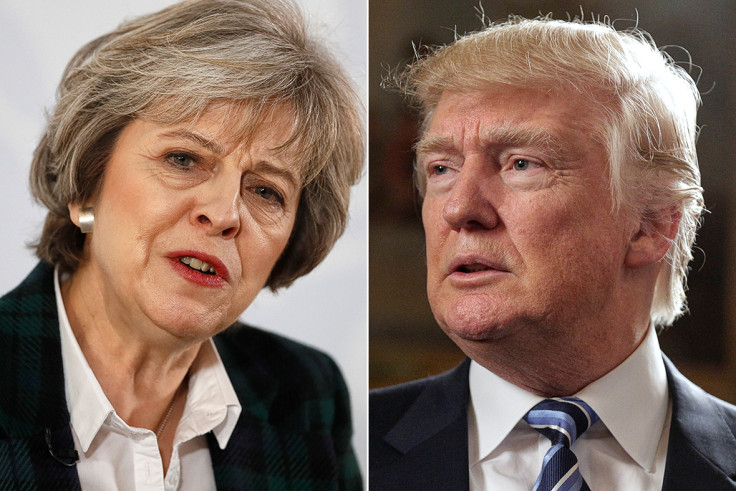Theresa May would be foolish to get too close to Donald Trump
The US-UK "special relationship" may be revived, but there is a wide moral chasm between Trump and May.
Prime Minister Theresa May has arrived in the US and is set to meet with President Donald Trump in the White House later today, 27 January. She will be the first foreign leader to get a face-to-face with the new man in the Oval Office.
The meeting is seen as an opportunity for the prime minister to revive the so-called "special relationship" between the UK and the US, an alliance that grew somewhat cold under President Obama, who was never one to place great emphasis on personal relationships with other leaders.
Speaking to Republican Congressmen at their annual retreat in Philadelphia last night, the prime minister laid out an impassioned case for the renewal of the special bond between the two countries.
"It is through our actions over many years, working together to defeat evil or to open up the world, that we have been able to fulfil the promise of those who first spoke of the special nature of the relationship between us – the promise of freedom, liberty and the rights of man," she said.
"So as we rediscover our confidence together – as you renew your nation just as we renew ours – we have the opportunity – indeed the responsibility – to renew the special relationship for this new age. We have the opportunity to lead, together, again."
Whether we will be experiencing a new honeymoon depends to a great extent on negotiations over a US-UK free-trade agreement, an issue of central importance to the prime minister that will likely dominate discussions between the two leaders.
Trump's team has signalled in the past the administration's intention to place the UK at the "front of the queue" for such an agreement and the first Congressional hearing on a free trade deal with Britain has already been set for 1 February.
It seems from this that we are steering in the right direction and the special relationship could soon be alive and kicking again – but is it really all that simple?
We should be careful not to get ahead of ourselves and indulge in post-Brexit fantasies that are not necessarily grounded in reality. Let's remember that, above all, we are dealing with a president ruthlessly determined to take his country on an isolationist, protectionist "America First" path, regardless of the losses counted by foes and allies alike.
Of course, protectionism is a broad principle and can manifest in many different ways. It is entirely possible that Trump's protectionist policy will indeed extend to an Anglo-American sphere and give the special relationship a fighting chance.
Nevertheless, when dealing with Trump, we are dealing with two essential problems: a moral deficit and a trust deficit – two factors that make the renewal of the special relationship ethically problematic and strategically unpredictable.
It is true that the UK and the US can profit from a renewed relationship, insofar as both countries are voyaging into unknown waters. For all its size, the US is not an island that can survive without partnerships and Brexit has opened up new possibilities for the UK.
Ultimately, however, the prime minister's view of the world is poles apart from that of Trump. May does not believe in torture or building walls. She has not cast aspersions on entire communities based on the actions of a vocal minority for cheap political points, as Trump has with Hispanics and Muslims. These are not small disagreements, but wide moral chasms where there are few, if any, bridges to be found.

Perhaps most challenging of all, Trump is a barrier to, rather than a facilitator of, greater trust between the two nations. Thus far, the Trump White House has not exactly built a reputation of reliability and consistency. On the contrary, they have embraced the dark arts of divide and conquer, exploiting – and in the process deepening – social fault lines for political gains.
For decades, the American political establishment considered the liberal democracies of Europe a vital cornerstone of US interests in the world. This rich history of cooperation, information sharing, and mutual support does not seem to hold much water with Trump, who sees a greater adversary in Chancellor Angela Merkel than in Russian President Vladimir Putin.
May would be foolish to play Russian roulette with our security and put the UK's relationship with Europe at risk by too closely aligning herself with an administration that has made no secret of its disparaging views of Nato, the military pact that has largely guaranteed peace in Europe since the end of the Second World War.
Almost 70 years ago, Winston Churchill immortalised the concept of the special relationship between the UK and the US in his historic Sinews of Peace speech. Some of his comments strike with a resonance today, as if history itself is desperately screaming into the White House's plethora of deaf ears.
© Copyright IBTimes 2025. All rights reserved.






















